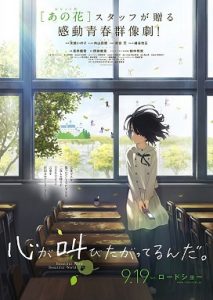
(Neo, Uncooked Media – There are also further observations on the film in an article I wrote for the AllTheAnime blog.)
Ever since she made a terrible mistake in her childhood, schoolgirl Jun has been afraid of speaking. But then she’s picked by her teacher to create her class’s next public performance, and her life changes when she learns to sing…
Anthem of the Heart repays repeat viewing. On first sight, this cinema film looks well-made but hackneyed, the kind of real-world teen drama whose clichés were smashed by A Silent Voice. But a second watch makes it clearer what Anthem’s doing.
In the simple story, four Japanese high-schoolers – two girls, two boys – are unwillingly roped into creating a school performance. One of the girls, Jun, is traumatised by a ghastly childhood incident, when she inadvertently caused her parents to split. Now she has a chronic fear of speaking, and is convinced she’s cursed, by no less than a demon egg. You could see Jun as an adolescent daydreamer – what Japanese people call a chunibyo – whose fantasies control her.
Yet Jun is tempted from her metaphorical shell by the boy Takumi. He has musical talents – Jun overhears his silly song about eggs – and finds that even when she can’t speak, she can still sing. Together, Jun and Takumi begin creating a musical play to express themselves. For Westerners, it’s funny to see a film about the principles behind musicals, given that so many Western cartoon films – and so few anime – are musicals.
Anthem takes one of the most commonplace, wish-fulfilling anime scenarios; the girl with deep emotional problems, helped by a kindly, talented, bland-seeming schoolboy who turns her life around. But while Anthem doesn’t exactly subvert this, it feeds in story and character elements that make things more complex and satisfying. (For example, two of the kids were once an item, but have now split, very unusual for a school anime.) It’s easy to take offence at the end, which tweaks expectations in a way that can feel superficial and sexist, but the feelings conveyed are more real than standard teen melodrama.
True, the film often feels like that melodrama, even risibly so, yet with many truthful touches. The direction’s less striking than Silent Voice, but there are moments of beautifully delicate character animation echoed in the script. A last verbal exchange between a girl and a boy, after the big emotional finale, is hugely satisfying in its working out of knotty emotions.
The sense of place is exquisite – the film takes place in the rural city of Chichibu, reminding us the Japanese countryside isn’t all the sticks. The musical finale uses a couple of famous non-Japanese tunes to gorgeous effect. But one cultural warning: the prologue, which shows poor little Jun’s catastrophic mistake, presupposes that you know the function of a love hotel.
